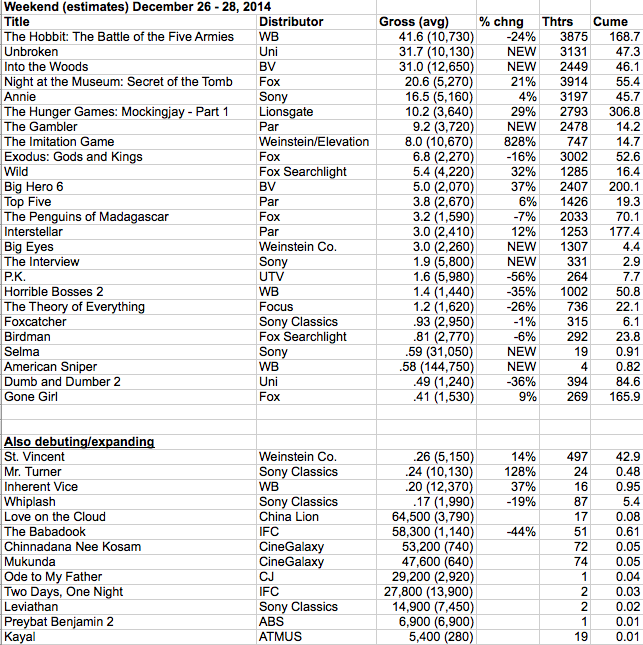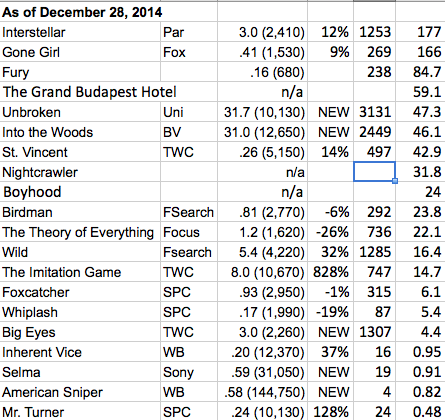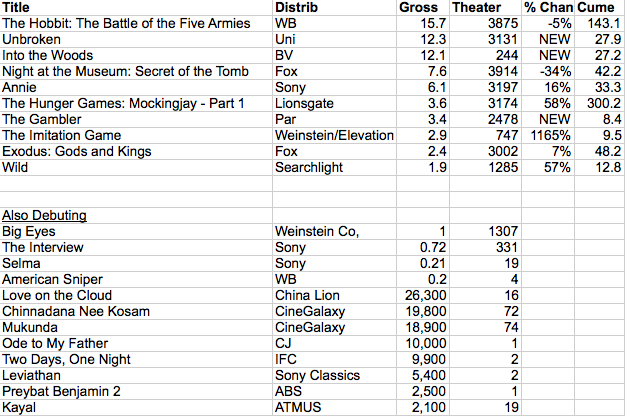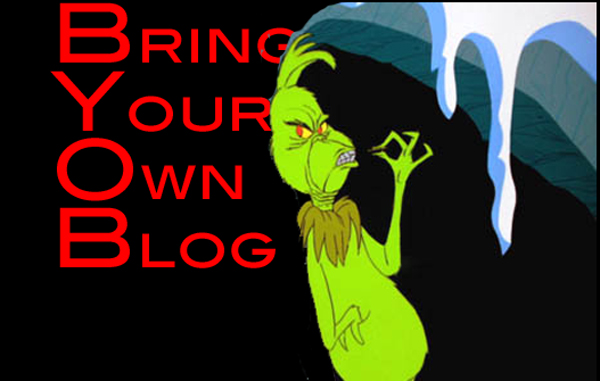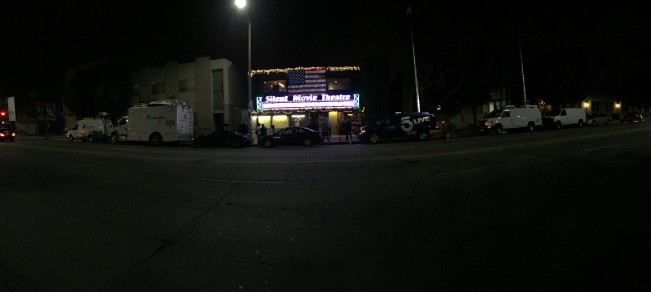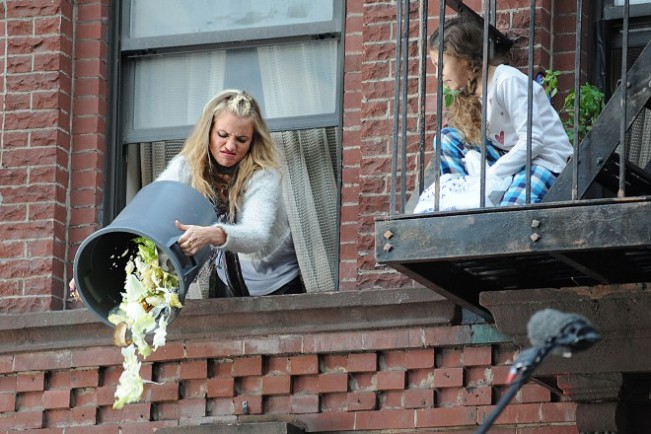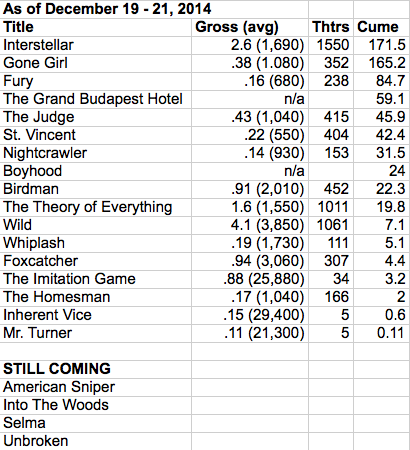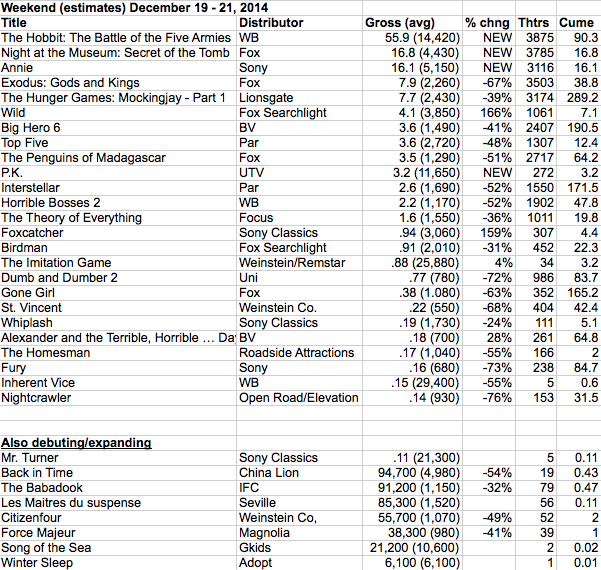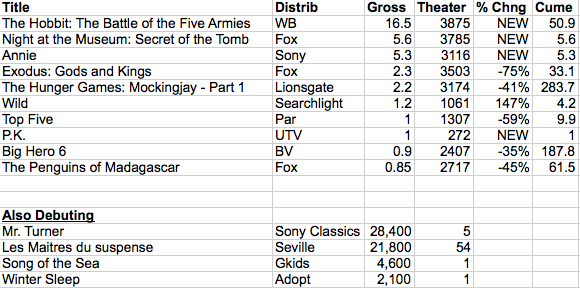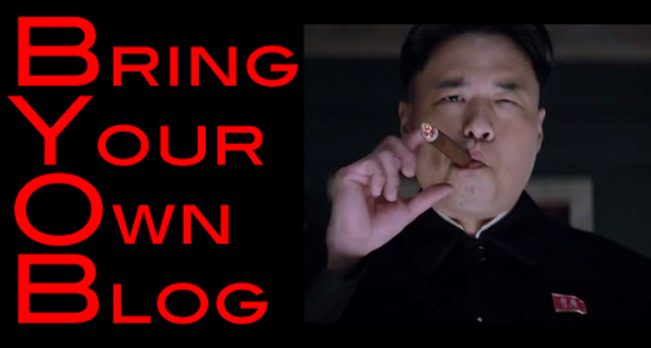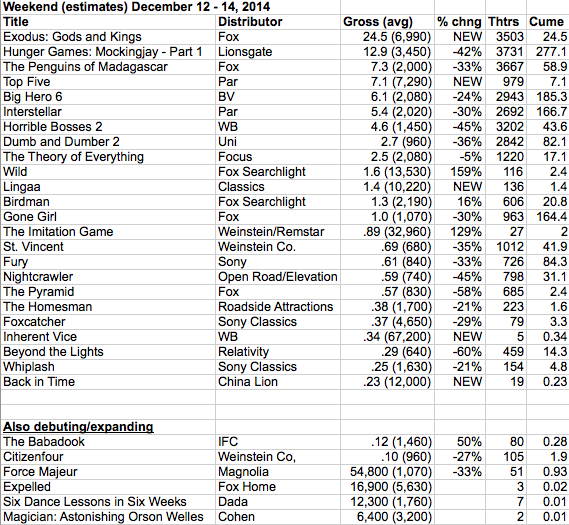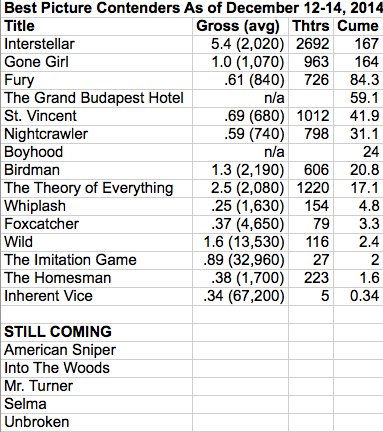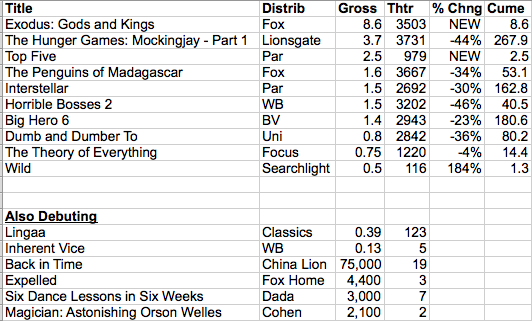The Hot Blog Archive for December, 2014
Weekend Estimates by 3-Day Klady
Nothing too surprising as the holiday weekend segues into the next holiday weekend…
The Top 10 all stayed in order from Friday. No one will do 3x Friday because of the gravity of Christmas Day on Thursday.
American Sniper did a huge $144,750 per-screen on 4 with a full release campaign and a strong push from both reviews and the military. To give perspective, WB has tried this strategy twice on Eastwood movies. The first time was Million Dollar Baby, which had 3 December weekends on 8/9 screens and never did $30k per screen. And grossed $100m domestic and won the Oscar. Gran Torino opened to $45k per-screen on 6. No Oscar, but $148 million domestic.
Anyway… what does the $114k per mean? No telling. For The Grand Budapest Hotel ($203k on 4) it meant $59 million domestic, which was a new record for Wes Anderson. For The Master ($147k on 5), it led to $16m domestic. For American Hustle ($123k on 6), it led to $150m. Best guess on Clint’s latest? $100m-plus. Same audience, for the most part, as Lone Survivor last year, which did $125m… though this one has a better chance with awards voters.
And speaking of Oscar…
34 Comments »Friday Estimates by Santa After Hours Klady
The Hobbit: The Battle of the Five Armies will pass $170m domestic and $500 million worldwide this weekend. It’s hard to get a legit comparative handle on the day-to-day between this one and the other two Hobbit films as this was the only one with a Wednesday opening. But it is ahead of the second one by most standards and it’s close to the first, ahead or behind, however you measure. Don’t cry for he, Peter Jackson.
The newcomers, Unbroken and Into The Woods, are still neck-‘n’-neck. Unbroken is a bit ahead. If there is a family audience for Into The Woods, that could flip today. Or not. As noted yesterday, both films are likely headed past $100 million… but probably not too far past.
Also opening on the wide track was The Gambler, which is doing modestly, benefiting from the holiday. Big Eyes on the ambivalent number of 1307 screens did an ambivalent (worse, really) $765 per.
The Imitation Game expanded from 34 to 747 screens on Christmas Day and did a very nice $4,9 per-screen on Thursday and $3,882 per yesterday.
Wild took a different route, leaping to 1,061 screens last week and doing a small expansion on Christmas Day to 1,285. Still, Friday-to-Friday the film had a 57% jump, which is impressive and suggests that Searchlight is getting nice word-of-mouth.
Opening in exclusive runs, American Sniper was the story, averaging a round $50k per screen on four yesterday. It’s slightly down from Opening Day, but not in a way that is remotely negative.
Selma took a steeper drop from opening Thursday to Friday, but is still doing well with a bit over $11k per screen on 19.
The Interview‘s indie-theater-only run on approximately 331 screens is doing fine under the circumstances. It’s really hard to read these tea leaves without a proper count on showings and, really, seat count, given that these are often small houses (and occasionally gigantic). For instance, LA’s Cinefamily is only 171 seats. So a five-screening day maxes out at 1,055 tickets or $14,770. And as noted before, American Sniper is averaging $50k per screen for Friday, so obviously there are at least 3x as many seats available in each of those theaters (by average). Add to this, that the $2,175 per screen on Friday doesn’t account for theaters where there may be only 1 or 2 screenings on the day.
The biggest question that seems to be on the media’s mind is how the day-and-date VOD for The Interview is affecting the theatrical numbers. And that too is pretty hard to guess at accurately without a lot of detailed information. That said, the claim that this is a big step for day-and-date VOD is as absurd as comparing any part of the experience of releasing The Interview to any other movie in modern history.
(CORRECTION: Typo in the first sentence corrected, “$170M” instead of “$179m”)
15 Comments »BYOBox Office
So as I predicted, The Interview opened to around $1 million and will work hard to get to $3 million for the five-day. It’s a very good number under the circumstances and will lead to a writedown by Sony in the next quarter. That is the price of the VOD choice.
Both Into The Woods and Unbroken are estimating Christmas Day launches of $15m and change. For perspective, one one film has ever launched to $10m or more on Christmas Day and not hit $100 million domestic… and that was Ali, at $100.2 million. The exceptional high is Sherlock Holmes, which opened to just under $25 million and did $209m domestic. After that, the high is Django Unchained‘s $163 million domestic after a $15m launch. You can safely presume that both these titles will land somewhere between $130 million and $160 million domestically. International will be a bigger challenge for both films, which is one reason why Into The Woods has so many Brits in the cast.
The Gambler opened to $5 million. Big Eyes opened small with $1.4 million on a weird 1,307 screens. The Imitation Game expanded well, as did Wild. Selma had a strong launch on 19 screens and American Sniper had an arguably better one on four.
This Christmas had stronger numbers at the top of the box office chart… but not quite as strong as you get down to the 6-7-8 slots and below.
Happy Return Day!!!
13 Comments »Review-ish: The Interview

It’s real simple. If you find James Franco playing a relentlessly positive buffoon right out of a Preston Sturges movie funny, you will love The Interview. If you find it boring and trite that Franco and Kim Jong-Un bond over a Katy Perry song and their hopelessly demanding fathers, you will hate The Interview.
There are other examples, but they just add more points of reference.
The Interview is not trying to be Kubrick. Seth Rogen and Evan Goldberg and credited screenwriter Dan Sterling are not that tough, not that intellectual. The Interview is a movie about the stupidity of celebrity media, the bad behavior of an angry child being given a lot of power, how people judge themselves and others professionally, male bonding, and a lot of Abbott & Costello silliness. Lots of dick, vagina, and bodily excretion references. “Honeypotting” and “honeydicking” are prominently featured in the film.
In the tradition of these filmmakers, nothing is sacred. To clarify that further, nothing is important enough to either take seriously or to even worry about. This is not a film about politics. It is funnier to name and portray Kim Jong-Il rather than “Made-Up Asian Dictator.” It’s like a stand-up comedy routine, talking about what his dad must have been like, why he gets so angry, how he does whatever he wants while his people suffer, about his bad hair. A sequence when Kim and Dave just go out on a joy ride and want to mess shit up is the comedy response to every Fast & Furious movie. But just as jokes about Obama are rarely about the details of his policy, neither is The Interview, as regards North Korea. And the filmmakers don’t take themselves seriously either. It’s a movie in which the directors, when Lizzy Caplan’s CIA agent comes to see the two lead guys, shows the characters’ eyes slipping down to check out her cleavage instead of looking at her face over and over again.
I laughed from the beginning to the end. Around 30 minutes in, I considered whether I was having the experience of the last week and this, the first screening in LA at 12:30 at night, or if I was just enjoying the movie. I was enjoying the movie. There was a moment in the credits, when the traditional disclaimer about characters not being real rolled by, that got a big laugh and applause. Not so much from me. I wasn’t watching through those eyes. I was just watching a silly, broad, very funny comedy about a couple of close male friends who represented high and low, going on a profoundly stupid adventure.
Not every gag hit for me. But there were clever twists that I didn’t anticipate. It’s a bit Stripes, a bit Abbott & Costello, a bit Sarah Silverman, a bit Midnight Run, a bit Transformers, a lot of Sturges, no Capra… it is Goldberg & Rogen. And if you listen to critics who just don’t like them, you are a fool. That doesn’t mean you won’t like the movie. But read reviews closely and note whether the movie is being reviewed or the new story and the expectation that the critic brought to the theater. The real surprise here is how far afield this movie goes… really wild stuff… and then brings it right back to an emotional, recognizable place.
But you decide for yourself If the idea of a dictator in a distant land shitting themselves might make you laugh, go to the movie for the movie, not the statement. If not, God Bless America and the First Amendment, but this one ain’t for you. It was terrific fun for me.
14 Comments »Seth Rogen & Evan Goldberg introduce The First LA Screening Of “The Interview”
Review-ish (spoilers): Annie (2014)

Annie is not only a carwreck of a film, but it is extremely frustrating because there are rotting strands of flesh hanging off the corpse suggesting something truly interesting, complex, and compelling.
Will Gluck, Aline Brosh McKenna, and the development team at Overbrook clearly had a lot of interesting ideas. Some make great sense, like Annie being a foster child and not an orphan as such. I have no problem with the conversion to a black Annie and Warbucks (now Will – Bill? – Stacks). I’m good with an update of the music. Making the rich guy a wannabe politician… makes great sense. Miss Hannigan as a failed performer… sure.
But the trouble really starts when these ideas—a pretty big leap —don’t seem to be enough for the filmmakers.
The movie opens by mocking the classic Annie… which is kind of an asshole move. This film is, ultimately, going to the same place. And this is not the only example of mocking homage in the movie. Sorry, folks, but you aren’t going to make The Millionaire and The Orphan Who Brings Him Humanity into something hip. Embrace the hokum. It’s in the DNA.
The first number in the film, as in the show, is “Maybe,” a sad, hopeful song about the dreams of the lost girls. And it got me. It was actually a lot more sad than any version of Annie I had ever seen. Because Quvenzhané Wallis is already presented as strong, smart, resourceful, and powerfully likable, the false hope of the song is terribly poignant. Also, there are only 5 foster kids in this incarnation. So there is something more intimate there too. But while I was feeling something, I was also fighting off overly busy direction that didn’t seem to make any sense. The girls gather on a bottom bunk, wrap a sheet in front of them, and wave flashlights against it. Why? I never found out. It was something to do. This let me know—and it only got worse—that the director didn’t trust the material just to do the show. No idea would ever be enough. It always had to be four ideas in a sequence, never letting an honest emotion flow (except one other time, which I will get to).
“It’s A Hard Knock Life,” another of the legendary numbers in the show, is another case of “if they just stopped trying so hard, this could be brilliant.” A really simple piece of instruction to the director was needed here… if the girls are so used to this situation and they are going to clean up, make sure every shot leads to the place being perfectly clean by the end. Empower the girls with actually making their efforts matter, even if Hannigan refuses to appreciate it, we, the audience, should appreciate it.
And that brings up to Miss Hannigan, a role that fits Cameron Diaz in an interesting way… except that she can’t sing or dance. The idea is really interesting. She is a failed singer. She was the “H” in the “C+C+H Music Factory” before they dropped the H. And following that a failed everything else. Okay… so why don’t we get the set-up established? She got a really nice old apartment in Harlem when she had a little money—maybe a sugar daddy—and now, she needs the $870 a month (or week… the movie is unclear) or so she gets for fostering 6 kids. The apartment can be assumed to be all that, but why no clarify it. There is gold in the details. Let’s say she gets $3,480 a month for fostering… and her rent is $2,800. How she is caring for the kids becomes obvious from that little detail. The feel of the apartment, too. All the girls are in one bedroom with three bunk beds and a bathroom with just a shower and she is in the master with a full bathroom that she doesn’t want the girls to ever see. Have one shelf for the girls in the refrigerator and all the rest for her. I’m not saying it has to be that, but that a little foundation would go a long way to make the relationship more than “comic villain vs little girls.”
Of course, the song “Little Girls” is a disaster here. Diaz doesn’t have the voice and we can feel her discomfort. But worse, we don’t really get a point of view in the song. Cameron Diaz’s Hannigan is still pining for her time as a “little girl.” The Hannigan of the original version of this show was more of a drunk spinster type. You can’t really get there watching Diaz. Something really bad happened to this woman. But she just keeps making faces.
But I am getting a bit ahead of myself. Quvenzhané’s “Tomorrow” is the closest the movie ever gets to just letting the song do what it is meant to do. And it’s over directed and overly fussy and but like everything else in the film. But you get the sense of what this film could have been again.
“I Think I’m Going To Like It Here” is not hideous, but feels like it was all chopped up and sponsored by Microsoft as video walls dominate the images.
And then, it’s over.
You see, the second half of the film is like they threw out Annie and just did “a kinda musical kinda based on Annie that someone saw once and decided just wasn’t that good.”
“You’re Never Fully Dressed Without A Smile…” nah… don’t really need that.
“Little Girls,” as already mentioned, is terrible and doesn’t move the story along at all.
And from them, there isn’t a real song from the show until a half-ass version of “I Don’t Need Anything But You.”
The problem with the new songs is that they are instantly forgettable and don’t seem to have anything to do with the show with which so many are familiar. I get adding a song or two. But dumping most of the show from the second half is just obnoxious. It could be less painful if the new songs were good. But they are not. They are auto-tuned bellowing that seems like a bad rip-off of Foxx in Dreamgirls. Brutal.
The premiere they all attend—”Moonquake Lake,” a parody of Twilight, et al—is not realistic (the footage is… the reaction of Stacks is silly). And Stacks has to run off to do something at a Giants/Jets game… which Annie wouldn’t want to attend because… uh, uh, uh…
And then, they kill off the whole Rooster and Lily concept… Hannigan’s conman brother who shows up with the idea of getting paid off as Annie’s long-lost parents and his moll. Was this always so? I don’t know. What kind of idiot hires Tracie Thoms to be in a musical in which she never sings? But they did.
Instead, the bad guy—and a new character from the launch, taking over some of Grace’s role—is Bobby Cannavale’s Guy, a political operative. He wants to have Annie’s parents show up because he thinks it will seal the deal for Stacks’ mayoral run and he’ll get his giant longshot payday (like a consultant getting a million dollar bonus for getting a Best Picture nod for this film). So he hooks up with Hannigan, utterly fucks up one of my favorite numbers (“Easy Street”), which is half-done as a dance in a club, and makes the movie even more confusing for no reason at all.
But even worse, this version that hacks up the original song still features Diaz trying to sing. And then they make it worse again with a new three-character number in which Annie, Stacks, and Hannigan whine about their lives. Glad I didn’t have a gun or access to heroin about then.
Enter the fake parents. No real set-up. (In fact, after a ridiculous audition sequence, the fake parents just show up, surprising Hannigan as though they had been edited in during re-shoots… hmmmm…)
And then, once again… a clever idea. Annie, being kidnapped, waves at passing cars and kids Instagram and Facebook and Tweet her, allowing the good guys to track her… and making the preposterous subplot about Stacks’ cell phone company being able to follow anyone at anytime irrelevant. (They mess this idea up twice. The first time, they have the bodyguard character brag that they can find anyone anywhere and through a decade of history… then it doesn’t work. Sigh…)
But the whole scene is such a mess of unclear emotion and ideas that it returns into one of the worst car/helicopter chases ever.
Finally, Annie is safe. And they sing a song from the show again (“I Don’t Need Anything But You”), which is staged in perhaps the most random location EVER in a musical, shot badly, then auto-tuned into a barely recognizable version of the song. (I kept waiting for Cher to pull off her Jamie Foxx suit.)
As if we needed a topper here, it comes with Ms. Diaz hogging the spotlight (surely not her idea) during the big reprise of “Tomorrow” in a bit so unfunny as to make the lack of self-awareness shocking and wince-worthy.
There was a dark, weighty movie here. There are still a lot of foster kids out there. And people need love. And we are disconnected by cell phones and their electronic cousins. Wallis is a treasure. Her Oscar-nominated debut was no fluke. She has got “IT” and plenty of it.
But if you don’t trust the show, don’t do a classic musical.
If you want to do modern versions of the score, do that! Do it well. Don’t use a few familiar threads and do a different song posing as the original.
If you hire people who can’t sing, stop making up new ways for them to sing more.
There is a great line in a Bobby Moynihan cameo at the end of the film. He is watching Stacks singing and “dancing” with Annie and he says something to the effect of, “He’ll never be elected mayor if he keeps breaking out in song and dancing like that.” That was one of the very few pieces of meta that worked in this movie. And it came way too late.
Do I believe that Grace really wants Stacks? No. Do I believe that Hannigan turns out to be a good person? No. Do I really believe Stacks is bald and wearing a weak of 1/8 of an inch-long fuzz? No. Does Sandy get lost? Yes.
The only thing I really bought in this movie was Quvenzhané Wallis. And Stephanie Kurtzuba, who you will recognize as the woman who looked a lot like Jenna Elfman in The Wolf of Wall Street, turns out to be the only person with lines in this film who appears to be capable of dancing professionally, and steals every scene she is in. (Rose Byrne, Cannavale, Akinnuoye-Agbaje and others tried to do it with a straight face and I don’t blame them at all.)
It reminds me a but of The Hulk. People didn’t really care to see the Ang Lee version or the Louis Leterrier version. I am not dissing them, but… the Hulk that people were waiting for was the one in Avengers… cerebral David Banner and raging wild Hulk who actually gets laughs on purpose. Joss Whedon got it. He gave the world the movie Hulk they wanted… not a new and improved Hulk.
When you change the music in half of Annie to new compositions that are clearly not from the original composers, you are saying, “It’s okay… we know you liked that… but this will be better.” And if the audience doesn’t think they are better, watch out. There is not bigger insult to people who really love something. And Annie, like it or not, is classic Broadway. And this movie is a classic mistake of bravado, arrogance, and overthinking something that could have worked really well… in fact, could have been better than the original because the context has made it more poignant for modern audiences than a nostalgia trip.
I saw the glimmer. Then the stench overwhelmed me. Damned shame.
Finally… would the Will Smith version have been better? I don’t know. But I would guess that it would have not worked so hard to shove chartable singles (not! But they tried) into the mix. Smith sings, but he is not a singer. Foxx thinks he is a singer. The superstar who understood how well The Pursuit of Happyness could work would have, I like to believe, made similarly daring and interesting choices here (even if Overbrook is still a producer of the film). But had he been in this script with this score, yes… Will Smith would have failed, too.
19 Comments »Weekend Estimates by Bilbo Klady
Five of the Top Nine December openings of all time are Hobbit or Rings movies. This Hobbit is #9. All-time. It’s not the top, but it isn’t anything to be unhappy about… especially given the choice to open close to Christmas itself than usual. There isn’t a whole lot more to say… certainly after saying as much about it as I did yesterday.
Not happy times at Fox or Sony, in context of their new releases, Night At The Museum: Secret of the Tomb and Annie. The extreme ranges for domestic grosses after openings like these in December go from $50 million to $170 million, so there is a wide berth for both. Next Saturday we’ll have a much clearer picture on both.
The Hunger Games: Mockingjay, Part 1 will pass $300 million domestic and $650 million worldwide this next week. Like Hobbit (at least, so far), not best in its class, but pretty damned great.
Wild is looking like a legit hit for Fox Searchlight. It should be well over $15 million by the end of the holiday.
Big Hero 6 lost a bunch of kids’ eyeballs to the incoming Museum and Annie this weekend, but it will still pass $200 million and Tangled to become the #2 Walt Disney Animation Studios domestic grosser of its seven-year history. International has barely started, but even if the film matches others, it will have a hard time getting close to Tangled‘s $391m international draw.
Strong expansion for The Imitation Game, with a $26k per-screen on 34 screens. This number is much more significant than the $100k+ numbers you might see on a 1 or 2 screen release. The other big per-screens were Inherent Vice ($29k) and Mr. Turner ($21k), each on five screens.
3 Comments »Friday Estimates by Orc-Lover Klady
The Hobbit: The Battle of the Five Armies is pretty much a fait accompli. The only question is, where does it land domestically (between $250 million and $350 million) and where does it land internationally (between $700 million and $800 million)? But we pretty much know it’s going to end up somewhere between $800 million and $1.2 billion. Yes, that’s a lot of wiggle room. But no opening weekend number, much less opening day, will tell the story. That number will be able to be narrowed to within $100 million or so in about 12 days, within $50 million in about 16, and soon thereafter, we will pretty much know the number. But today, it is the first Wednesday opening of a Hobbit movie, though all three Rings films opened on Wednesday. And it is the latest (in the year) launch of any of the three Hobbit films. So…
Night At The Museum: Secret of The Tomb is the third of its trilogy, though it’s no Hobbit (unless you mean it is relatively small and has furry feet). This is not a great start for the film, but we won’t really know how bad it is until tomorrow. This is the odd case of a franchise moving from a successful December pre-Christmas launc to summer and dropping precipitously (28%), but still trying again, moving back to the pre-Christmas slot. Even more ominous, the second film opened much bigger than the first ($54 million to $30 million), but only did about 3x opening domestically while the original did more than 8x opening. So what are we back here? Well, according to published reported, they cut the budget by about $25 million, which is probably the tipping point of where Fox would be comfortable with a similar gross to #2… most of it probably coming out of Ben Stiller taking less up front and the rest from production. But this opening day suggests that getting to the gross of #2 will be a struggle. And foreign may not be coming to the rescue as the international on #2 dropped almost as hard than the domestic (27%). That goes against the franchise trend line of recent years…. thus the move to London.
There are a lot of people screaming about the trend to franchise films right now. I believe much of that is a new layer on top of the rest of the studio product, demanding a lot more spending and not eliminating smaller films (though budgets have been reduced in a big way for non-franchise films). That said, this is one of those examples of Franchise Fever overwhelming logic. Maybe there are DVD numbers that ameliorate the box office numbers suggest a bit, but logically, this is $250 million-plus in Fox money that could have gone somewhere else to better effect. Even the Chipmunk franchise, while trending way down domestically, is a lot cheaper to make and is still holding pretty solid internationally.
And then there was Annie.
Only 19 musicals have ever opened on over 1,000 screens at one time in the history of the movies. To be fair, many came before the era of the wide release. But of those 19, only 4 have hit $100 million domestically. And at the risk of chants of “racism” being raised… there are many countries outside of America where “colorblind” casting just won’t play because of those nations’ prejudices against black people. Sorry, but it’s true. Denzel has made progress in breaking that. Eddie Murphy, no. Jamie Foxx, no. Ride Along did 12% of its hugely profitable $154m worldwide gross outside of the U.S. My point being that domestic numbers on this version of Annie are more critical than on most major releases these days. But back to musicals…
Of the 19 wide-release musicals, only 4 got to $100m domestic; Enchanted, Hairspray, Mamma Mia!, and Les Miserables. And the only 1 to open in December was Les Mis.
Doing a black version of Annie was kinda brilliant when it was Will Smith in front of it, with or without his daughter. He has kinda faded since Hancock, making a cheap drama, a very expensive drama in which he was not really the lead, and a sequel no one really wanted. But After Earth still did $183 million internationally. Jamie Foxx’s only films that did as much as $135 million internationally were two animated Rios, Spider-Man, and Django. Foxx can generate some box office, but he’s not close to Will Smith on Will Smith’s weakest day, even now. And Cameron Diaz, who plays well overseas, is still only in the low 100 + change area as the focal point of films internationally. The two of them together don’t equal or come close to a Will Smith draw. Moreover, when you have Will Smith, you can have a Kristin Chenoweth or an Idina Menzel playing Miss Hannigan and giving you a knockout performance that becomes an attraction.
Anyway… I’m thinking it will do better than Rock of Ages ($39m dom/$59m ww) because of the holiday, more along the lines of Muppets Most Wanted ($51m dom/$78m ww), leaning a little more heavily to the domestic. This is not quite a lump of coal in Sony’s stocking, but it’s not sweet.
I was wrong about Exodus: Gods & Kings. I thought the Christian audience would turn out. They have not. Internationally, things are a bit more hopeful… but its in its early days there.
Decent expansion for Wild, now up to 1,061 screens from 116. The film could well be up around the $15 million mark or higher by the end of the holiday.
Top Five is a great comedy and a shock for Paramount, which just hasn’t found a way to get audiences of any color to show up in numbers. Someone out there has more insight into this than I do. From the caucasian perspective, I imagine some see it as “too black,” which is not to say “bad,” but to say “not for them.” Chris Rock may seem too old—shocks me to type that—for the young audience to get excited about this movie, which they would love And adult audiences of color? I don’t know. Is Rock signaling something by doing so much high-end NY press? Does Charlie Rose and the New York Times help or hurt in this case? I am aware there is a lot of race talk in this column today, but I think the Annie stuff is considered and fair. And this… just frustrates the hell out of me, because I don’t imagine that a lot of people wouldn’t enjoy Top Five if they gave it a chance. And for the record, Paramount is only in for $12.5m and marketing, so they may come out of it unharmed. But this should be a $100m comedy easily… and that isn’t happening as of this writing.
Decent start for Mr. Turner on five.
18 Comments »The Sky Continues Not To Fall
People in this business and around it are somehow comforted by the notion that things are going terribly, terribly wrong.
I was struck strongly by this today when I ran into Mark Harris’ Grantland piece, “The Birdcage (sub-hed) How Hollywood’s toxic (and worsening) addiction to franchises changed movies forever in 2014.”
I read it. I read it again. You should read it now if you haven’t.
Mark is a really, really smart guy. He has great insight into art and history. But this piece is remarkably wrong on a number of levels. It trades on some of the mythologies about Hollywood that I have been writing about and arguing about for a couple decades already.
* The first big myth is that, somehow, the existence of one kind of movie displaces the existence of another kind (or kinds) of movies. People believe this instinctively. But there is little to no proof that this is the case.
Hollywood, for instance, is making many fewer adult dramas. But that isn’t so they can pay for more CG superheroes. It is greatly because dramas (and comedies) got fat on DVD money and started being budgeted for insane amounts. These films could have been made for much smaller budgets and profits thinned, so the gravy train had to stop.
If you look at the box office numbers on dramas you will see that the average numbers are up for those films as they are for the big dumb movies… they just aren’t the same kind of numbers. They never were. No one expected them to be. The standard is profitability, not size.
The adjusted gross for The Way We Were is still less than The Fault in Our Stars grossed this year.
This is not to say that studios are not obsessed with having franchises that are both huge and hugely profitable. But like any ambition for the highest level of success, there are nothing close to guarantees.
There were two Shailene Woodley films that grossed almost the same amount this year ($289m/$304m). One was a teen drama. The other was the first of a series of franchise films. Both made a profit. But the franchise film just hopes to be as profitable over 3 films as the drama was the first and only time out.
Of course, the franchise’s sequels are going forward and they will pray for growth, but won’t lose money if there is none. Also moving forward are multiple teen dramas involving author John Green. And the director of The Fault in Our Stars is now working on two Stephen King projects.
Did Fox, which made Fault, say, “We can’t make the teen drama because we are making an Apes sequel”? No, of course not.
David Fincher made his last three films for (reportedly) $120 million (Benjamin Button), $40 million (The Social Network), and $90 million (The Girl With The Dragon Tattoo). He made Gone Girl – with New Regency in the lead – for a reported $60 million. Is that the ghetto? Did Fox say, “We are spending more on Days of Future Past ourselves than we have on any movie before… so we can’t do Gone Girl with our partners?
Quoting Mark: “Almost everything else that comes out of Hollywood is either an accident, a penance (people who run the studios do like to have a reason to go to the Oscars), a modestly budgeted bone thrown to an audience perceived as niche (black people, women, adults), an appeasement (movie stars are still important and they must occasionally be placated with something interesting to do so they’ll be cooperative about doing the big stuff), or a necessity (sometimes, unfortunately, it is required that a studio take a chance on something new in order to initiate a franchise). A successful franchise is no longer used to finance the rest of a studio’s lineup; a studio’s lineup is brands and franchises, and that’s it.”
Well… are Fault and Gone accidents, penance, bones, appeasements, necessities or… exceptions?
Neither film can spawn a sequel. Both films are dramas. And they are amongst the most successful films of the year, though yes, neither is in the Top 15 for the year. So they must be exceptions.
How many exceptions challenge the rule?
Lucy, The Lego Movie, Neighbors, Fury, The Grand Budapest Hotel, The Monuments Men… we’re now up to 8 “exceptions” in the $150 million club for 2014, total membership 41 this year-to-date. But don’t forget to lop off the 12 mega-budget movies that also top the charts for the year. So it’s 8 “exceptions” out of 29 titles.
There are another 7 “originals” in the club that aren’t aiming as high. I don’t know what kind of bone they gave Kevin Hart and Ice Cube for Ride Along or to Cameron Diaz to make The Other Woman. Was Annabelle a necessity or an accident or just another trend that studios have been keen on since Paranormal Activity, the under-$10 million thriller that can’t lose money and can hit a geyser?
* The second myth is that things have changed, in terms of the mindset of the studios, dramatically compared to the post-original-studio-system past.
Mark goes back to 1999 and spins a little about how many sequels there were that year. Well, I went back as far as Box Office Mojo goes with annual data, 1980, and of the Top 20 films that year, 6 were either sequels or would be sequelized and three more were follow-up movies or would be followed up by reuniting casts and/or directors to exploit the prior success (Stir Crazy and Seems Like Old Times, and Caddyshack).
“Even as late as 1999, for instance, only four of the year’s 35 top grossers were sequels.”
Eleven films from the top thirty-five of 1999 were either sequels or remakes/spin-offs of long-established characters. Six of the Top Ten worldwide were these films; Star Wars 1, Toy Story 2, Tarzan, The Mummy, Bond, Austin Powers 2. Then there were Wild Wild West, Sleepy Hollow, Pokemon 1, Inspector Gadget, and The Thomas Crown Affair. And yes, only one of those was a sequel.
And by the way, 11 of the Top 35 were sequels or remakes in 2008, too.
What has changed is the proliferation of the mega-budget. Absolutely. A big change. And people who make smaller movies feel dwarfed by them. But they are still making the other films. And they are making them for more than they were in the DVD era. They aren’t making 1999 movies like The General’s Daughter for over $90 million anymore. They are making Notting Hills, though probably for $10 million or so less. Adam Sandler comedies have been reduced back to the kind of budgets he had in 1999 (which is likely why he is heading to Netflix). Aside from having 20/20 hindsight about what would hot and miss, I would like Mark or anyone else to tell me what studios movies were made in 1999 that might not be made by a studio today. I don’t see many, if any.
What I do see is a series of films that could not exist in 1999, before the CG era started in 2000 with Spider-Man, that now sit on top of what looks like a very familiar set of studio films in 1999 (the example picked by Mark). There were a dozen this year. The cost bit more than $4 billion to produce, distribute, and market.
Using Fox as an example from 1999… they distributed, but did not fund The Phantom Menace. The collective production budgets for their 15 other releases was, it seems, under $350 million. They probably spent nearly double that on worldwide marketing. But the entire year for under a billion. That is a different universe than the one in which we now live. But Fox put out 16 movies this year and the 9 movies that were not animated or “tentpoles?” A bit over $300 million.
*The third myth is that the mega-budget movies dominate the studios now and will do so more intensely moving forward.
This is a true thing at Disney. They have built out this strategy with their purchases of Marvel, LucasFilm, and indeed, Pixar.
But at the rest of the studios, we still see more balance than people think. Fox, I’ve already noted. At WB, for instance, there are 5 $100m+ budget movies this year and 16 “others,” none of which cost over $70 million. Paramount is releasing only 12 films and 5 are $100m or more… the rest all south of $60 million. Sony had only one mega-budget film and the most expensive of the other 16 releases was Fury’s reported $68 million with almost all the rest under $50 million.
*The fourth myth is that everyone who now longs for some of the numbers that Disney has delivered in the last few years would somehow be willing to walk the path that Disney is walking… or will surely walk it soon.
Just a week or so ago, Comcast’s CFO announced at an investor’s conference that this will be the most profitable year for Universal’s film division, ever. A couple of tentpoles moved into 2015, skewing the survey a bit, but they will have released 14 films this year, none of which have reported budget of over $70 million and only 2 of which are over $50 million.
They may lust for the parade of big grossers at Disney and they may repeat often… but they aren’t morons.
*The fifth myth is that the bubble in which most of us in the media and in the film industry tend to live is the only place where the multi-year announcements of Marvel and DC and others are taken as some sort of gospel, which is to be dissected as though it is a fait accompli.
This one is simple. If a couple of Marvel movies bomb, the strategy for years 4, 5, and 6 change radically. And anyone who tells you differently is full of crap.
Calling the shot is an old schtick. Sometimes, the guy hits the home run to where he was pointing. Mostly, he does not. The CG films have about a 2.5 year period from greenlight to release (varies based on all kinds of things). But “Untitled Marvel Movie About Obscure Character” in 2019 isn’t greenlit… doesn’t have a script… and relies on the ongoing health of the entire Marvel Universe.
* The sixth myth is that everything but mega-budget movies is now almost impossible to fund, that the mega-movies are happily funded, and that anything that is less than massive is in a ghetto of sorts.
Everything is hard to fund. Very few films of any size are being made by one funder in 2014. There are key funders, but while Megan Ellison may have brought us a lot of great movies lately, there are not underfunded or cheap… and her brother is bringing us the next Terminator, whether we like it or not.
Yes, there are giant funding organizations that are set up to fund really big movies at studios. And there are many small ones set up to help fund movies that can’t get pre-production distribution. And there are many in between.
Is it harder now to get “small” movies made than before? Yes and no. People are out there making a lot of them for very little money… some very, very good films. And some filmmakers who are used to getting $60 – $90 million pretty easily are finding that door closed. But Ron Howard is still making movies of skill and size and quality… maybe the best work of his career. Barry Levinson has his second truly indie film out this year. Tim Burton did Big Eyes on a smaller budget than any film he’s made since Pee Wee’s Big Adventure…. and the writers couldn’t get the funding with them directing… but hey, the movie made and out there.
You can write off the entire Oscar season as a bunch of freaks, but those films aren’t freaks. There is a system for them. And they live. And they thrive. Was there a time when Inherent Vice and Big Eyes and Boyhood would have been easily made at a studio? When? Where? Don’t fool yourself. The budget for The Long Goodbye was $1.7 million. UA released it, but it wasn’t mainstream or easy.
The future of the industry and the quality of films is forever changing. Just because they make a sequel to something or because it has a huge budget doesn’t make it unoriginal. And being inexpensive and inaccessible doesn’t make a movie either original or inherently good. This seems obvious. But broad strokes do not serve the reality of this world of film.
I think Mark has a lot of worthwhile things to say… but mostly, they seem to be about Disney and the path on which they seem to be being chased by WB. But you know, Warners was trying to reboot their DC movie business for 15 years since they killed it with Batman & Robin. And then, as Christopher Nolan made Bat-magic, Marvel came along and created the concept of the “Marvel Universe” and after a slow start, it took off beyond imagination. Given that WB is the only other studio that owns a historic mainstream comic book business, of course they are looking at the strategy. And they haven’t followed it exactly.
But I remind you all that the man who employed John Calley at WB, Steve Ross, took over the studio by building an empire on a garbage, parking lot and limo business. The salad days at Paramount in the 70s were overseen by a rough character named Charlie Bludhorn. One of the primary importers of foreign language film in the U.S. was Roger Corman.
It’s easy to make fun of Kevin Tsujihara and Jeff Shell as “not movie people.” And they are not. But the idea that anyone running Universal would pass on another F&F movie or a spin-off of Despicable Me or the reboot of Jurassic Park that was on the stove long before Shell arrived at Universal is absurd. To suggest that Kevin Tsujihara is more prone to the Harry Potter spin-offs or getting DC on track than any of his predecessors, who tried and failed at the latter, is just going after what seems to be low hanging fruit.
It struck me really funny to see Josh Boone’s idea to make The Stand into four movies being mocked. Mark doesn’t see how it will be different than the TV mini-series, “except for the fact that it’s going to be “epic” (which is what we now tend to say when we mean some Peter Jacksonian combination of long, loud, and slow to climax).”
So Josh Boone, who had one of the most profitable studio movies of the year and made it for under $15 million is… what? A fool? And Peter Jackson, who brought Tolkien to life for 100 million-plus committed fans and did what he saw fit to do, meaning 9 – 12 hours for both Rings and Hobbit, and made massive revenues and made defining films for generations… a goof?
I have no problem with anyone disliking or not loving Tolkien or Stephen King or CG-driven movies, etc, etc, etc. But just because popular taste and your personal taste don’t jibe does not mean that alarms need ringing.
Have we crossed a bridge in 2014 from which the film business can never return? Not at all.
Here are some quotes…
“Film is not merchandise!”
“No true art has ever been a popular craze.”
“About six producers today pass upon [reject] 90 percent of the scripts, and cut and edit 90 percent of the picture… there are only a half-dozen directors in Hollywood who are allowed to shoot as they please… I would say that 80 percent of the directors today shoot scenes exactly as they are told to shoot them without any changes whatsoever, and that 90 percent of them have no voice in the story of the editing.”
American films “literally poison the souls of our children, young people. young girls, who are to be turned into the docile slaves of American multi-millionaires.”
“Film Dips To Only Terrific From Used-to-Be Sensational”
“The day of the big studios is finished. Their costs are two high and there isn’t any way to get those costs down – really get them down – without tearing them apart and rebuilding from the ground up.”
“Had I been able to foresee what cinema would become, I never would have invented it.”
“Tough for a movie that isn’t a big media-created event to find an audience, no matter how good it is.”
“There’s been a polarization of performance at the box office. The big movies perform well and everything else dies.”
I’m guessing that many of you have already figured out that these quotes and headlines are not from last week… though they well could have been. They come from (in order) 1926, 1930, 1939 (by Capra), 1945, 1947 (Variety headline), 1953, 1965, 1974 (Kael), and 1996. I thank the still-remarkable David Puttnam book “Movies & Money” for being the home of these quotes and many others that remind us that circumstances change, but the song remains the same.
There are, certainly, changes from which we cannot return. I have been going on about the shortening of windows for 20 years, because if the studios continue to push exhibition, they can kill exhibition. And 2500 IMAX screens will not be a full exhibition business, if it came down to that. Theatrical revenue has been under siege by the media and “forward thinkers” for decades and the thinking is simply wrong. As we move forward into a true “everything everywhere” future, theatrical will be one of the only true differentiators to the bottom line separating TV and movies. But if shrunken windows kill off another 20% or so of the theatrical business, exhibitors will start going out of business. And replacing them won’t be easy, if at all possible.
The idea of Disney or Warner Bros announcing slates for the next 6 years is dick measuring at its most primal. But in the end, they still have to make, sell, and release the movies. And it’s never been easy. And it will never be easy.
But strong films get made every year and will be made every year. And some years they will have higher budgets. And some years lower. And quality will sneak out where we least expect it. Art and commerce have always had a battle in the film business.
It’s not a perfect system. Not by a loooooong shot. But never forget that every film is a unique organism. Each one has a life and a mind of its own. And at Disney right now, it’s bread and circuses.
I get the idea that there seems to be more stupid, a much longer marketing window (which, I might explore another day, seems to be about making for a much shorter TV ad buy window, which is the biggest cost in movie marketing), and a whole lot more noise. But as we have found year after year, ComicCon, for instance, is great as solidifying the base, but studios still need to much more widely market all but the least expensive films if they want a big enough audience to see profits. ComicCon can be oppressive. But when you step away, you realize how few people really care what happens there.
In Mark’s closing graph he offers a view of 2020, asking, “Do you imagine that your taste will be exactly what it is today? Hollywood profoundly hopes the answer is yes. Your sameness is what it prays for.”
Actually, not. Because no more than 10% of the people reading Mark Harris at Grantland (or this column, really) have the taste for the endless loud noises that the imagined fiendish “Hollywood” offers now. And in 5 years… you’ll all be too damned old to go to the movies regularly… or not quite old enough to have the time to do so. For the big, dumb movies, Hollywood wants whoever is under 24 and over 8 in your house. And the rest? “Hollywood” just hopes you will get off your couch and the endless parade of content streaming and MVPDing into your home and go to the movies half-a-dozen times a year.
It’s fun and easy to feel like the victim of the noise and the loudest, brightest (maybe lest challenging) films on the market. But if you really love movies, there were about five movies I could recommend to you in any major city on any week of this year… and surely in years to come. Hail Hydra!
45 Comments »Weekend Estimates by Box Office: Disapointments and Kladys
Not a ton more to draw from today’s estimates than from Friday’s estimates. Nothing really did anything unexpected over the rest of the weekend. Openings seen as disappointments can be made to look a lot better by the upcoming holiday… or not. We’ll see.
Mockingjay 1 remains the very strong ($611m ww) weak sibling of the franchise. Interstellar passes $600 million, at an almost 3-1 international-to-domestic ratio.
The big holiday warhorses land next weekend: The Hobbit finale, the allegedly final Night At The Museum, and the Annie remake.
30 Comments »Friday Estimates by Klady: Estimates & Actuals
So what does the Exodus: Gods & Kings opening mean? Unclear. One could argue that the giant audience of Christians that do not normally go to the movies but show up for occasional special events (The Passion, Narnia 1) did not arrive for the film this weekend. Or one could argue that only Christians (as a group) showed up, as the number is about the same as Fox’s low-budget surprise, Mark Burnett’s Son of God. I don’t know.
My bet would be that Christians and other religious groups are sticking their toe in the Nile, and that they’re the prospective the word-of-mouth that will either make this a strong player through the holiday or not. And that there are limited mainstream audiences that are interested in a biblical epic… especially one with mixed-to-negative criticism floating out there. Unless Cinemascore has added a “how much do you love God?” tab to their polling, they won’t be telling us either. Sunday will be an indicator. But mostly, we will be waiting for next weekend, when the film goes up against Hobbit 3 and will either hold steady or be crushed.
Similarly, Top Five, which is deservedly beloved by what seems a majority of critics (and audiences who have seen it), suffers by comparisons to another film in its genre, Borat, which rolled out slowly on 837 screens in 2006 when the media hype didn’t quite match audience interest. But that film did $9.2m on opening day compared to T5‘s $2.5m.
Here’s what must be really disturbing for Paramount. Kevin Hart’s second concert movie, Kevin Hart: Let Me Explain did $3.8 million on its first Friday, even with some of the must-see ($7.4m worth) siphoned off by a Wednesday opening (and a strong Thursday). So the hardcore black audience isn’t showing up in droves.
Is Chris Rock a tweener? Can he deliver the “urban” audience? Is his courting of more traditionally white media too smart for its own good, intimidating the people whp simply want to see a big laugh comedy?
Please read this carefully… I think Top Five has as many laughs as any movie in years, and is neither primarily nor secondarily about race. It is a comedy with what felt like a cast 80% of color, but it is not a film that is limited by this, either for white people or people over 40. To call it “colorblind” would be wrong because Rock does not put blinders on about anything. But much as I see Amy Schumer as a post-feminist comedian who digs deep into the issues of being a woman, I see Rock as a post-racial comedian who digs deep into the reality of being “of color” in America.
I don’t know why people haven’t gone to see Top Five in bigger numbers. They are only denying themselves a true pleasure. Maybe the current talk – endless talk – about the Sony hack and the Obama jokes and the importance of Selma at this moment, has worn people out on the topic already – though People of Color in America have to live with it daily and have for longer than anyone reading this has been alive – and they think that this movie is going to continue that conversation somehow. It doesn’t. It makes you think. It makes you laugh. Hard.
Maybe a fairer comparison for this movie is Woody Allen, who has never had numbers this good on any weekend, whether at this screen count or better. (His best ever was for Midnight in Paris, with a $5.8m weekend.) But that would seem to ghettoize Mr. Rock as well.
Paramount is smart. They can handle both the huge movies and the smaller ones. I hope that plays out here. This film should be a massive, all-audience hit.
On the Oscar scene, expansions for The Theory of Everything (826 to 1220 screens), Wild (21 to 116), and The Initiation Game (8 to 25). All look pretty successful, though Theory and its bigger count is more about maintaining at this point and Wild and Imitation are more about building to the next stage.
Launching in exclusive runs is Inherent Vice, which will do an impressive $75k per or so… but only on five… which doesn’t foreshadow anything clearly. It’s not as big a start as The Master, but WB ain’t Weinstein and Paul hasn’t been on rogue operations with this one.
Birdman is actually up Friday-to-Friday, even though it’s losing screens. Maybe it’s an award season bump, though the weekend total is still just headed to the $1 million range.
Gone Girl is slowing, as would be expected, but will pass the $165m mark next weekend. Big Hero 6 is looking at, as it seemed from the start, a number between Wreck-It Ralph and Tangled.
18 Comments »BYOB Globes
Getting on a plane… but here is some space to chat…
25 Comments »




